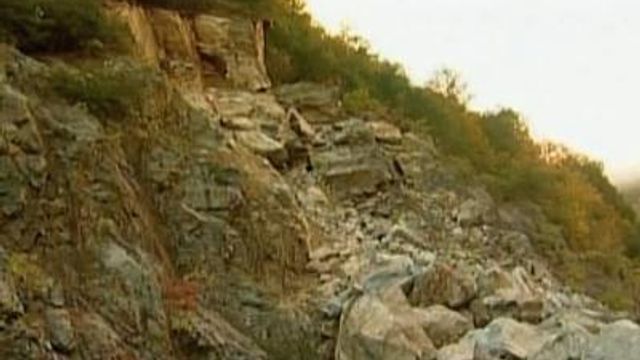Engineers develop plan to clear I-40 rock slide
The slide occurred Sunday morning near the Tennessee line, leaving rock debris 150 feet high and 200 to 300 feet wide, closing I-40 in both directions
Posted — UpdatedThe 150-foot-high, 200-to-300-foot-wide slide occurred about 2 a.m. Sunday near the Tennessee line, closing I-40 in both directions.
The Department of Transportation said Tuesday that it plans remove rock in the lower and middle section and blast large boulders into smaller pieces.
It will use those rocks to construct a ramp that will help crews lift equipment to the top of the slide using a pulley system. Crews will then remove rock from the top down to the bottom.
Once all the debris is cleared, crews will lay temporary asphalt so that traffic can be restored until permanent asphalt can be laid in the spring.
The estimated cost of the project is $2 million to $10 million, and Gov. Bev Perdue is expected to make an emergency declaration, which will allow the state to ask the Federal Highway Administration for federal funding.
Officials have estimated that workers could take up to three months clearing the interstate in a steep section of the rugged Pigeon River Gorge. They say the freeze and thaw of rainwater over decades likely caused two huge sections of rock to split.
The three-month timeline depends on good weather, Joel Setzer, regional engineer with the DOT said.
The slide area was still unstable on Monday as cracks in rock above the interstate continued to widen. The slide is about 80 feet wide and just as massive as a 1997 slide that happened two miles to the west. That slide was more dirt than rock.
Traffic on the interstate has been detoured nearly 140 miles north using the new Interstate 26 into Tennessee, leaving tourism-dependent businesses in the far western counties worried.
"We are going to feel it," said Tammy Brown, marketing director for Cataloochee Ski Area in Maggie Valley, which attracts more than 100,000 visitors a season.
The slide didn't mean much to tourism on Monday, officials said.
Many leaf-season tourists are already there, and the state Department of Commerce said that as the fall colors begin to peak, mountain towns are still accessible from I-40 for visitors.
Lynn Minges, with the commerce department, recommended that travelers heading to Tennessee take the new I-26 through Madison County to see fall colors.
But the closed interstate could become a serious problem for the economy in the months ahead.
The slide repairs will run right into the meat of the ski season. Cataloochee had been developing a strong market in the Knoxville and east Tennessee area, Brown said. I-40 east was the main travel route for those skiers.
"It is never a good time for this, and I am hopeful that DOT's estimates are on the extremely cautious side," she said.
Meanwhile Monday, DOT spokesman Jerry Higgins said the highway department plans to put maps outlining the recommended detour and the roads that are open in the region on the department's Web site and in rest areas.
Motorists traveling west to Tennessee should take I-40 West to Interstate 240 West (Exit 53B) in Asheville to I-26 West (Exit 4A), then follow I-26 to Interstate 81 South (Exit 8A) in Tennessee, back to I-40.
Eastbound motorists should follow the reverse route.
The DOT said Monday that Sunday's slide could have been worse had it not been for work pinning rocks in the slide-prone area.
In July 1997, two slides shut down the same stretch of I-40. Two people were injured when their vehicle ran into a boulder in the westbound lanes of the highway. Three others sustained injuries when a huge rock hit the top of their van on I-40 East.
A major slide in the mid-1980s closed two tunnels on I-40 near the Tennessee border for several weeks.
Copyright 2024 by WRAL.com and the Associated Press. All rights reserved. This material may not be published, broadcast, rewritten or redistributed.






